Interview: Victoria Clark Discusses Directing 'Scaffolding' as Part of Premieres' INNER VOICES
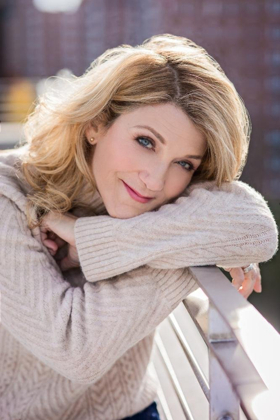
Victoria Clark is nothing less than a Broadway superstar best known as an actress for roles such in Cinderella, Sister Act, and, of course, her Tony winning turn in The Light in the Piazza. Not short on talent or training, Clark returns to her earliest career goals taking on the off-stage role of director as part of Premieres' season of Inner Voices.
Clark directs one of three pieces, Scaffolding, which tells the story of a single mother sending her son off to college and ramifications of choices she makes during the process in an effort to protect him. Clark took a moment to speak with BroadwayWorld about the project and her work as a director.
How long has Scaffolding been in development and how did you get involved?
This is the first time we've put it together. Artistic Director Paulette Haupt contacted Jeff [Blumenkrantz] a year ago or more and asked if he wanted to write a piece. He decided to write book, music, and lyrics, which is obviously a huge task. I think he was seeking a second collaborator because when you're doing everything you need feedback. I came on as a dramaturg and as a feedback person around March or April. It started as a monologue, he wrote that first, then basically it all came out and the lyrics flowed and the music flowed right out of the monologue.
There's definitely a great deal of flow to the piece. It's very tight with a lot of movement, how did that come about?
We found as we were staging it that we envisioned the character as a woman in motion, a super-mom multitasking and doing all these things that needed to be done in a very short amount of time. We realized that there was no fat in the story, it's a very lean text. There was nothing to be thrown away, no activity that would be completely distracting. We tried to find very organic behavior without doing anything that would distract from the action or her emotional journey. That was a lot of the work we did with Rebecca [Luker] was finding the right balance for that. She is so astonishing, just as a person. She's so lovely and very generous and she'll try anything. She always looks pleasantly surprised by anything you say to her. She's such a good actress I wouldn't know if she weren't! She's very game and she's brave. I loved working with her and with Jeff.
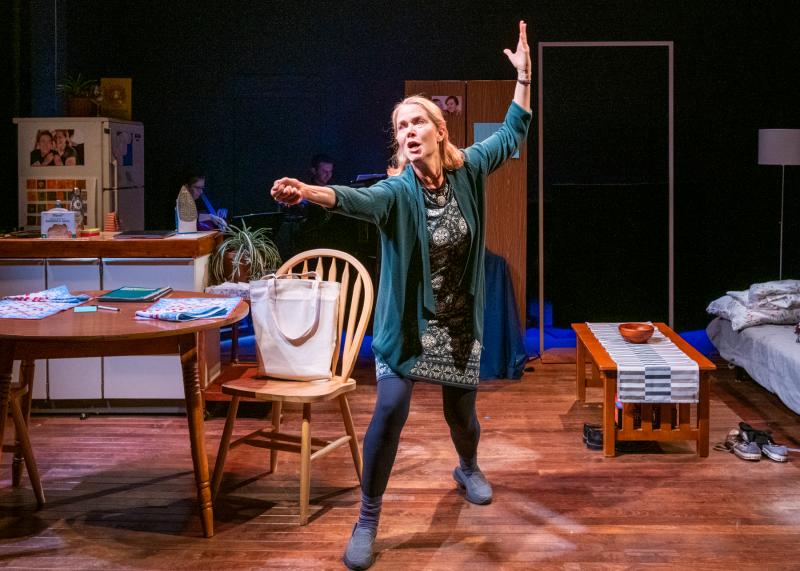 What's your process like when approaching a piece as a director?
What's your process like when approaching a piece as a director?
Everything is different. The first thing I like to do is talk to the writers. There are a lot of works people direct where the authors are no longer living. One of the great things about new work is the author is right there, and you're creating it with them. I really try to listen hard to what they see and what they saw when they wrote it. I want to try to give them as much of what they envisioned as possible, but without taking away my own ideas or my own imagination about where it could go. It's always a balance and collaboration to make sure you're fulfilling the author's vision but also expanding on it and emboldening it and fleshing it out in surprising ways. Not in crazy tangential ways, but taking something and making it three dimensional in a way that pleasantly fulfills the visions of the author.
With Jeff it was reading the versions of the monologue as they came in and calling him up and saying this is what I think about this section or that. Certain sections went in and out, there was a certain part of the story that he didn't write that I thought was dramatic that I thought he should dramatize, other things he wanted to cut. We're shaping things right up to opening tweaking things here and there. Meanwhile I'm also looking at things like the lighting and saying is that really the story you want to tell?
Inner Voices features three separate and relatively unrelated works, how did you work to balance Scaffolding in that context?
Paulette chose the pieces for their thematic similarities and even some practical similarities like Window Treatment and Scaffolding both take place in a Manhattan apartment, both of them make the audience very aware of the city. The Costume takes place in a different era and there's a different feel but incorporates themes of family, single women. They all have that. They tie together in a lot of different ways.
Going third in a long evening is rough, so for our piece I sat in the audience to get an idea of what they're going through, figuring out how our piece, despite being an independent work, fits together with the other two pieces on the program.
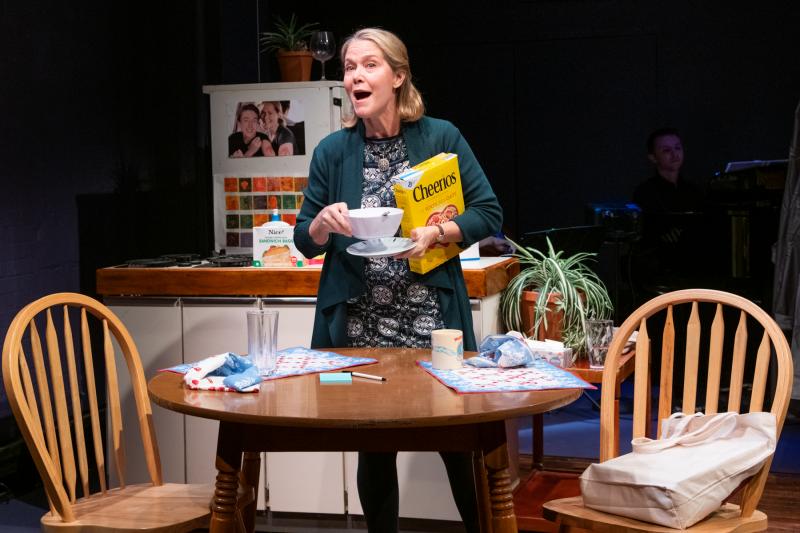 This piece deals with some very emotional questions surrounding parenthood and the mother/son relationship facing serious issues. Was it hard to work with the subject matter?
This piece deals with some very emotional questions surrounding parenthood and the mother/son relationship facing serious issues. Was it hard to work with the subject matter?
It was definitely emotional. I was a single mom for years, I have one child who is also a boy. The set is basically a recreation of many of the apartments that I lived in with him. It's crowded with memories, drawings, painted woodcuts, notebooks and sticky notes, receipts, paintings, photographs. We worked really closely with the designers to make it seem instantly recognizable as a family place but specific to New York. I can't say enough about the designers, they have just been astonishing.
It was both very comfortable to work on and uncomfortable, being a mother myself, because it's a piece about parenting and the risks we take as parents and the decisions we make followed by the consequences. There's not a single decision you make as a parent that doesn't have consequences, good and bad. How much do I tell him, public or private school, when do I start talking to him about drugs and alcohol, he's being bullied at school, he might be gay, he might be trans, he might have a reading disability. At every turn there needs to be consideration and thoughtful communication. Our piece is about that communication and relationship and the consequences of our hard choices.
Jeff has never had a child, is obviously not a a woman, and yet I feel that he's painted so beautifully how tortuous it can be when you don't know if you've done the right thing or not. It's one risk, one stab in the dark after another. Just when you think oh yes, I know how three works, I know how to handle a three year old, they're not three anymore, they're five. Then you're thinking five, pre-school, kindergarten, reading, got it, and then they're done with that. The kid is always a length ahead of you, taunting you, they've already moved on.
Rebecca's character has a moment where she says 'having my son is the best thing I've ever done' and every time I hear that I get a little choked up because I agree, that's the best thing I'll ever do is have a kid. Everything else sort of pales in comparison. You know she means it and that's what makes it so devastating to watch the story progress because you know her son is her whole world.
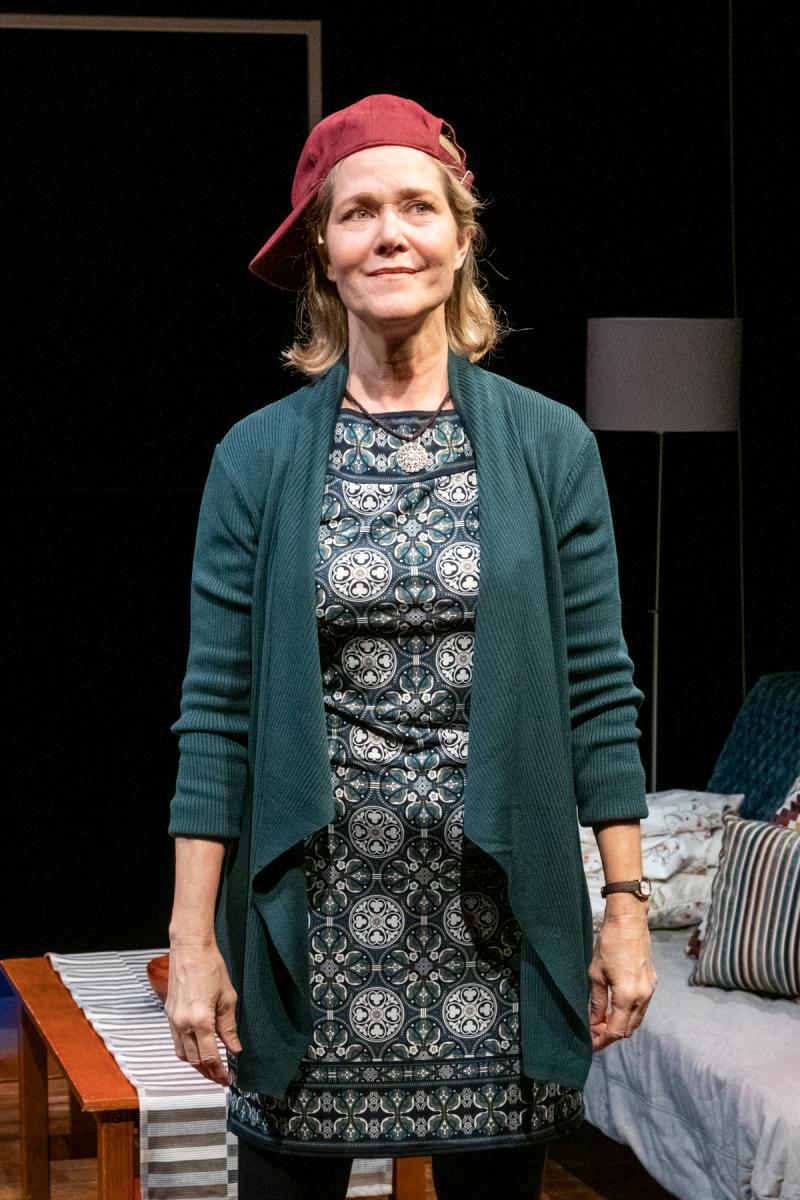
You're best known for your wonderful work as an actress but have recently spent more time directing. What made you decide to make that shift? How has your experience as an actress and working with so many directors affected your style as a director?
I trained as a director, had the opportunity to just do directing, and started working right out of college in my early 20's. Then I kind of got sidetracked and got hired as an actor which led to the next thing and the next thing. I thought this is a fun life, it's playing and experimenting and exploring. It's been everything. I've had a 36 year graduate school basically because every project that I worked on, though I have worked with certain directors more than once, a lot of them I've only worked with once. There's a big difference between male and female directors, directors who are former actors and not former actors, I've worked with some wonderful directors and some that weren't as clear and you learn from both. While I work with someone I'll think I'll have to remember to say that when I'm directing, or I'll have to remember to never ever ever say that to anyone while directing. You learn from the good and the bad and both by watching other people make mistakes and making your own.
My decision to start directing again came from this longing that I'd always had to see that dream realized. It was my first dream when I went to college. I thought it would be one those things that if I never went for it I'll wonder what would have happened had I tried. It's also one of the areas in our industry where the women are way behind the men, so if for no other reason than to start balancing the numbers I decided I had to do it. I have a lot of students in my life and young women that are coming up, and I want them to work with me and to show them this can be a pleasant, inspirational, life changing experience. You can do this. It's hard to direct, there's a lot of pressure on you, and a lot of people are counting on you to do things, but it's no more difficult than raising a child. If you can be a mom, you can direct! Even if you're not a mom, you can do it.
The biggest blessing for me is being able to work with friends like Rebecca and Jeff and Paulette and our music director Benji Goldsmith and cellist Yari Bond (who are mother and son) and and to be able to collaborate together. The way I look at it, it's about storytelling. As an actor, as a director, as a team, there's a story to tell.
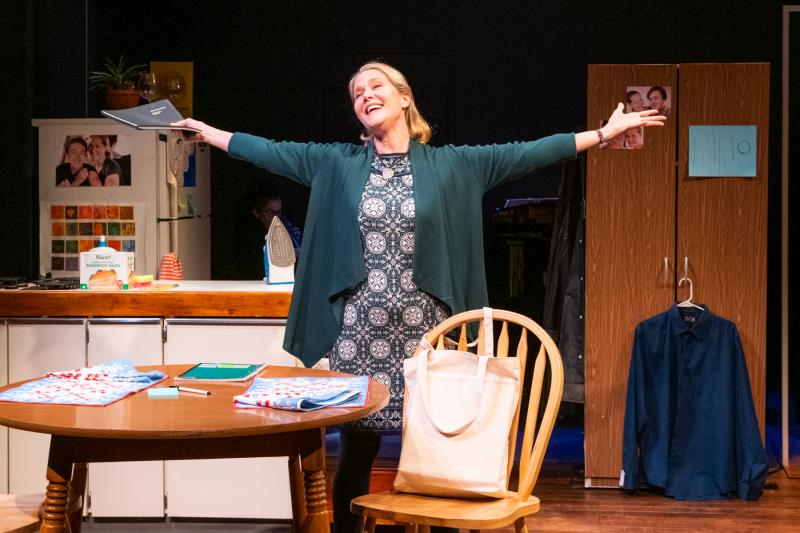
Inner Voices is currently on stage at The TBG Theatre and celebrates opening night tonight, November 1. Tickets are available at www.PremieresNYC.org.
Victoria Clark headshot credit: Bjorn Bolinder; production photo credit: Russ Rowland
Videos

